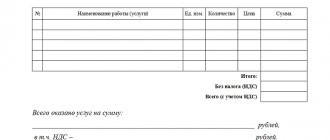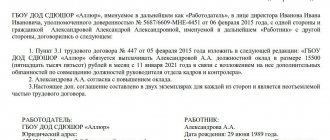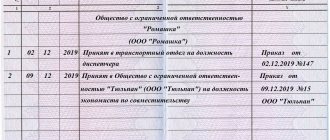Part-time work is a phenomenon that occurs all the time. The desire to earn extra money, especially if the salary at the main place is not too high, is natural for every person. And if for an employee everything is simple and clear: he found a second job, a selection came and began performing the assigned functions, then for the personnel department the question arises: how to register a part-time worker.
How to formalize the transfer of an internal part-time worker to the main employees?
The concept of internal part-time work
The concept of “part-time work” itself is the performance by an employee of additional permanent paid work in his free time from his main duties under the terms of an employment contract with the same or another employer.
With external part-time work, the employee works at the main and additional jobs for different employers. In case of internal part-time work, the employment contract is concluded with the same employer for whom the specialist performs the main work.
One should also distinguish between the concepts of “internal part-time work” and “combination of positions”. In both cases, the specialist performs additional work at the same enterprise where he works as a main employee. However, internal part-time work is precisely the performance of work not related to the main activity in free time (Article 60.1, 282 of the Labor Code of the Russian Federation). In this case, employment is assumed at 2 completely different rates with appropriate registration and payment for each.
Internal combination involves adding additional job functions to the main job. That is, when combined, a specialist is engaged in additional responsibilities along with the main ones .
Part-time work: highlights
Let's start with the fact that there are two types of part-time work: external and internal. External is when an employee does not work in the organization, but comes as a part-time employee from outside. In case of internal combination, an employee who is on the company’s staff is involved in performing tasks.
Question: Is it possible to arrange external part-time work with an employee during maternity leave to maintain her right to receive benefits? View answer
For internal and external combination, it is important that a number of conditions are met. In particular, formality and regularity of work, decent wages and time free from main activities. At the same time, each employee has the right to perform as many additional duties as he can physically handle - in this case, the law does not provide for any restrictions.
The main difference between internal and external part-time workers is the paperwork when applying for a second job.
Question: The employer offers the employee to temporarily perform work in a vacant position in the organization until the relevant employee is hired. Is the employee entitled to receive a salary for the position being filled? In what order should an employee be registered (part-time work, increasing the amount of work)? View answer
Hiring for internal part-time work: legal aspects
The possibility of part-time employment is allowed by Art. 60.1 Labor Code of the Russian Federation. Such employment is regulated by Chapter 44 of the Labor Code of the Russian Federation.
In case of internal part-time work, as in the main place, it is necessary to conclude an employment contract . It must indicate that the job is a part-time job .
The legislation (Articles 282, 329, 276 of the Labor Code of the Russian Federation) provides for a ban on part-time work for the following persons:
- minors (under 18 years of age);
- state and municipal employees;
- specialists for harmful (dangerous) working conditions - if they already work under the same conditions at their main job;
- workers in the transport sector - if they are already employed at their main workplace in work related to driving vehicles or organizing their movement;
- military personnel, lawyers, judges, prosecutors (except for teaching, science and creativity - if this does not interfere with the performance of their main duties);
- security guards - in relation to public service and paid work in public associations.
What rate can you apply for when working part-time?
Labor legislation establishes one significant limitation regarding how much time an employee is entitled to spend on part-time work. Namely: he can be entrusted with work that takes no more than 4 hours per day (Article 284 of the Labor Code of the Russian Federation).
However, if on some day an employee is not busy at his main job, he has the right to work part-time all day. The main thing is that in a month he does not work more than half of the monthly norm that the legislator has provided for the corresponding category of workers.
In addition, there are other cases when a part-time worker can work more than 4 hours a day.
Read more about this in the article “Part-time work - how many hours per week?”
Thus, in general, part-timers are attracted only at 0.5 bets, which means they receive an appropriate reward. How to calculate the specific amount of such remuneration?
The procedure for registering an employee for internal part-time work
Internal part-time admission is generally standard. But there are some nuances.
The procedure for applying for employment for internal part-time work is as follows:
- An employee writing an application for internal part-time work.
- Fulfillment by the employer of the obligation to the employee to familiarize himself with the internal labor regulations . This condition is provided for in Part 3 of Art. 68 Labor Code of the Russian Federation. They do this without fail (despite the fact that the employee was already aware of these rules when he joined this organization at his main workplace).
- The employee provides the employer with the documents necessary to formalize his part-time employment. Documents, copies of which are already in the hands of the employer, do not need . But sometimes, to work in a new position, an employee needs special knowledge or other qualifications. Then he must confirm his competence with a document on education (qualification) or a duly certified copy thereof.
- Conclusion of a separate employment contract with a mandatory indication of the conditions for part-time work (Part 4 of Article 282 of the Labor Code of the Russian Federation). Focusing on the fact that part-time work is internal is not necessary .
- Drawing up an order for hiring a part-time employee (it must contain a link to the employment contract).
- Reflection of information about the hiring of a new employee in information about labor activity.
- Making an entry about part-time work in a paper work book (if the employee wishes).
Preparation of documents for internal combination
In order to correctly register an internal part-time worker, it is necessary that an employment contract be signed with the employee. But first, the employee needs to write an application for combination . In this case, you no longer need to present any additional documents - copies of your passport, SNILS, Taxpayer Identification Number, education certificate, etc. are already stored in the personnel department of the organization. The only thing worth considering is that if you plan to apply for an internal part-time job in another specialization, then the employee will be required to provide documents confirming it.
Question: The JSC transferred an external part-time worker to the main employees by drawing up an appropriate additional agreement to the employment contract. Can a JSC submit a report in the SZV-TD form ahead of schedule, that is, on the next business day after the date of execution of the transfer? View answer
After accepting the application, an employment contract is signed . Its main essence should not differ from a regular employment contract, but it is necessary to include the designation “on a part-time basis.” In addition, the number of hours an employee spends on part-time work cannot exceed 50% of the standard number of working hours per week.
The employment contract signed by the parties is the basis for the issuance of a corresponding order by the management of the organization, which must contain the number of hires as an internal part-time worker, as well as a mention of the employment contract.
If the employee expresses a desire, then in his work book, the company’s personnel specialist is obliged to make a record of the combination.
So, let's summarize. To arrange internal alignment, you need to take several steps.
- Receiving an application from an employee about the desire to work part-time;
- Signing an employment contract with the employee “on a combination basis”;
- Issuing the relevant order;
- Making an entry about the combination in the employee’s work book (at the request of the parties).
Application for employment as an internal part-time worker
In accordance with the norms of the Labor Code of the Russian Federation, in order for an employment contract with an internal part-time worker to be considered concluded, such an employee, among other documents, must write an application for employment on an internal part-time basis.
In the application, in particular, he must indicate what work and at what time he wants to do additional work so that his main work does not suffer.
The application is submitted in writing to the HR department of the employing company.
A sample application for an internal part-time job can be downloaded for free in our other article “What you need to know about internal part-time and combination jobs.”
How is an external part-time worker paid?
Art. 285 of the Labor Code of the Russian Federation defines the following payment options for external part-time work:
- for hours actually spent on work, based on the hourly rate;
- for the amount of work actually performed;
- on any other terms based on the provisions of the employment contract.
The salary of a part-time worker, like any other employee, must be paid twice a month (Article 136 of the Labor Code of the Russian Federation).
In addition, the company should remember that part-time workers are entitled to leave of at least 28 days (Articles 114, 115 of the Labor Code of the Russian Federation). Moreover, the employee must receive such leave at the same time as he rests at his main place of work (Article 286 of the Labor Code of the Russian Federation).
Part-time employees should also know that they have the right to count on receiving all the guarantees and compensation due to them not only at their main place of work, but also at part-time work, with the exception of guarantees for those combining work with study and workers in the Far North (Article 287 of the Labor Code RF).
In particular, for guarantees for pregnant women who are part-time workers, see the article “Maternity benefits for part-time workers.”
Employment contract for internal part-time work
An employment contract with an internal part-time worker is concluded in writing in 2 copies (one for each party). The employee and employer must sign both copies. On the employer’s copy, the employee additionally puts his signature to confirm that he received his copy of the contract (Part 1, Article 67 of the Labor Code of the Russian Federation).
The agreement is drawn up in any form. For micro-enterprises that have completely or partially refused to adopt local regulations, a special standard form of an employment contract has been developed (approved by Decree of the Government of the Russian Federation dated March 27, 2016 No. 858).
The employment agreement typically reflects the following points:
- general provisions;
- rights and obligations of the parties;
- features of employee remuneration, provision of social guarantees;
- operating mode;
- liability of the parties;
- amendment and termination of the employment contract;
- duration of the agreement.
Among the features of the contract with an internal part-time employee are the following:
- The contract must contain a clause stipulating that the employee will be employed as a part-time worker (Part 4 of Article 282 of the Labor Code of the Russian Federation). It is not necessary to clarify that we are talking specifically about internal part-time work .
- Separately, the contract must specify working hours if it differs from the regime established by the organization’s labor regulations. It is important that the part-time worker’s working time is no more than half the working hours in his main position in a calendar month.
- An agreement can be concluded for a certain period (fixed-term), if both parties agree to this (Parts 1 and 2 of Article 58, Part 2 of Article 59 of the Labor Code of the Russian Federation).
- A specialist can work in his main job and part-time in the same position.
- The contract must specify the terms of remuneration (including the size of the employee’s tariff rate or salary, additional payments, allowances, incentive payments, etc.).
- The employer can stipulate a probationary period in the contract.
- The contract should not contain conditions regarding the impossibility of employing an employee in other organizations, since the legislation of the Russian Federation does not limit an employee in the number of employers.
- The contract should not contain conditions that worsen the employee’s position.
A sample employment contract with an internal part-time worker can be downloaded for free from the link in the article “Employment contract with a part-time worker: sample”.
Internal alignment: the essence
The peculiarity of internal combination is that an employee can combine work while in the same position. This practice is common, for example, among teachers and professors, when they teach part of the classes in one subject and part in another. Most often, internal combinations occur at the request of employees, which management willingly supports: hiring a person you already know well is much more profitable and productive than hiring a stranger.
Question: Is it possible to register a part-time employee with the same employer for temporary work (up to 2 months)? What is the correct way to then indicate in the dismissal order that only one fixed-term employment contract is terminated and the main one continues to be valid? View answer
Working hours and remuneration for internal part-time workers
The work and rest schedule of a part-time worker is prescribed separately if it differs from that established in the internal labor regulations. If a separate work schedule is not provided , then the contract can be limited to a reference to the internal labor regulations (part 2 of article 57, part 1 of article 100, article 284 of the Labor Code of the Russian Federation).
An important indicator is the length of working hours. After all, in fact, part-time work is part- time work. And it should be up to 4 hours per day (shift) or no more than half of the normal working time per month (another accounting period).
It is not necessary for a part-time worker to have a lunch break if he works up to 4 hours a day (shift). The contract may provide for a condition that on days when a specialist does not have to perform his duties at his main place of work, he can work part-time full time. In this case, a lunch break should be provided for him.
The work of an internal part-time worker is paid in accordance with:
- the company’s remuneration system – time-based, piece-rate, time-based and bonus;
- working hours.
In a time-based system, wages are calculated in proportion to the time worked. In the piecework system - based on output or on the terms specified in the employment contract.
When working part-time, the employee (as well as the main staff) has the right to receive additional payments, allowances, compensation, incentive payments established by the labor legislation of the Russian Federation. He also has the right to receive temporary disability benefits and other social guarantees.
The remuneration of an internal part-time worker may be lower than the minimum wage, since the part-time worker actually works on a part- time basis.
A part-time worker has the right to annual paid leave . The employer must provide it simultaneously with leave for the main job. Even if the employee has not worked part-time for six months , leave for this position must be provided to him in advance .
Part-time workers have the right to both annual leave and additional leave provided for by current legislation and collective agreements.
Domestic part-time work and parental leave
How is internal part-time work carried out during parental leave? This question is of particular interest and has essentially two sides:
- can a young mother work as an internal part-time worker while on such leave;
- how to register an internal part-time worker to take the place of a young mother on such leave.
The answer to the first question is given by Art. 256 Labor Code of the Russian Federation. It states that an employee can, if she wishes, work part-time while at the same time being on maternity leave. She will not lose benefits from the state and experience. You can also refer to Art. 93 of the Labor Code of the Russian Federation, which deals with the use of part-time work.
The second issue is resolved by concluding a fixed-term employment contract with another employee. Often this becomes an internal part-time worker. The document must indicate the duration of the contract and the reason for the urgency. In the case of a part-time worker performing the duties of a woman on maternity leave, it is usually indicated that the employment contract was concluded for the period of maternity leave of the employee (the main employee), and her last name is indicated. Urgency is also indicated in the personnel order for an internal part-time worker. The work book does not indicate urgency. This follows from the meaning of Art. 57-2 and 59-1 Labor Code of the Russian Federation.
The main thing is brief
- Internal part-time work is a way to get additional work in the same company where a citizen already works.
- Such labor relations are formalized by a separate agreement.
- Part-time work within an organization should be distinguished from combination work within it. The main difference is that part-time work is possible during time free from the main job, and the working day of a part-time worker is limited to 1⁄2 times the rate. The combination of such conditions excludes. Part-time work can be performed at the same time as the main one, there are no restrictions on working hours.
- Registration of an internal part-time worker is similar to registration of a new employee with whom an employment contract is concluded. There is no need to re-submit employment documents to the personnel service, with the exception of those confirming the qualifications of a part-time worker (if necessary). An entry in the work book of a part-time worker is made only at his request.
- Internal part-time work for a woman on maternity leave is not prohibited and does not lead to loss of child benefits and length of service. She also doesn’t need to start her main job at the same time as a part-time job.
- A part-time worker working in place of a woman on maternity leave enters into a fixed-term employment contract with the administration for the duration of her absence.
Order on hiring an internal part-time worker
As a general rule, after concluding an employment contract with an internal part-time worker, the employing company must issue an order confirming the hiring of a specialist (Article 68 of the Labor Code of the Russian Federation).
The order must state that the employee will work on an internal part-time basis.
Thus, there will be 2 : one for the main position, the second for a part-time position.
Although today there is no obligatory order form, there is a recommended unified form of order for hiring an employee. This is form No. T-1.
You can get a free employment order using the T-1 form using the link in the article “Unified Form T-1: form and sample in 2021.”
What categories of citizens cannot be part-time workers?
Not every person can apply for part-time registration. The following categories of citizens cannot perform other work during additional time:
- minors;
- people working in enterprises with dangerous or harmful working conditions;
- vehicle drivers (if you want to get a similar position);
- employees of private security companies, including managers;
- employees of the budgetary, military and municipal spheres;
- heads of enterprises (their employment on a part-time basis is possible only upon receipt of the appropriate permission from a higher authority or the owner of the organization).
Results
In the economic situation that has developed on the territory of the Russian Federation, internal part-time work is a fairly common practice. When looking for additional income, most people prefer to increase their paid workload at their main, trusted place of work.
If the employer decides to hire an internal part-time worker, he must properly formalize his employment: conclude a separate employment contract with such an employee, do not forget to receive the relevant application and missing documents from the employee, and also issue an order to hire an internal part-time worker.
Read also
14.10.2020
Categories
Such a phenomenon in the labor market as part-time work allows, on the one hand, to effectively use the employee’s labor potential, and on the other, to increase the overall level of a person’s material security.
The most important feature of the legal status of a part-time employee is that he has entered into at least two employment contracts (with one or more employers). This is the main difference between a part-time job and a combination job.
Part-time work as a legal category occupies a special place in labor legislation; in the organization of such labor relations there are features regarding the conclusion and termination of employment contracts, working hours, the provision of leaves and benefits, work restrictions, as well as guarantees regulated by law.
WHAT IS COLLABORATION?
Dictionary. performance by an employee, in his free time from his main job, of another permanently paid job for the same or another employer under the terms of an employment contract (Article 282 of the Labor Code of the Russian Federation).
The peculiarities of labor regulation for persons working part-time are discussed in Chapter. 44 Labor Code of the Russian Federation. Based on Art. 282 of the Labor Code of the Russian Federation, we can conclude that part-time work meets the following requirements:
- performed under the terms of an employment contract;
- carried out during free time from the main job, that is, at the end of the working day (work shift) for the main job, including on weekends, during vacation;
- to be paid by the employer.
In accordance with the norms of labor legislation, when working part-time, it is mandatory to conclude a written employment contract. The contract and the order (instruction) on hiring must indicate that the work is performed part-time.
Types of part-time jobs
Labor legislation provides for two types of part-time work:
1. Internal part-time work may be carried out by an employee with an employer at the place of his main job. In this case, in addition to the previously concluded employment contract for the main job, an agreement on part-time work must be concluded.
In practice, this type of part-time job can be beneficial for both the employer and the employee himself. The employer entrusts the work to the most qualified employee who is able to ensure the implementation of the tasks facing the organization, and the employee has the opportunity to increase his level of income and more fully realize his abilities.
2. External part-time work involves the employee performing job functions in another organization. That is, an external part-time worker is an employee who works for another employer in a certain specialty, profession, position, qualification under a second employment contract in his free time from his main job.
Note that the number of “additional” employers with whom an employee has the right to enter into an employment contract for part-time work is not limited by law.
ADMISSION TO PART-TIME EMPLOYMENT
Who can be a part-time worker?
In general, part-time work does not require special consent from the employer at the main place of work. An employee has the right to independently realize his desire to work part-time.
However, current labor legislation contains some restrictions regarding part-time employment. So, in accordance with Art. 282 and 329 of the Labor Code of the Russian Federation, part-time work is not allowed for the following categories of persons:
- those under 18 years of age (at all jobs without exception);
- persons engaged in heavy work, work with harmful and (or) dangerous working conditions (if their main work involves the same conditions);
- workers whose work is directly related to driving vehicles or controlling the movement of vehicles - in work directly related to driving vehicles or controlling the movement of vehicles;
- in other cases provided for by federal laws.
Restrictions on working as part-time workers are also established for persons occupying certain positions:
- deputies of the State Duma of the Russian Federation cannot be in public service and simultaneously engage in other paid activities, except for teaching, scientific and other creative activities[1];
- heads of legal entities can work part-time for another employer only with the permission of the authorized body of the legal entity, or the owner of the organization’s property, or a person (body) authorized by the owner, etc.
Required documents
The Labor Code of the Russian Federation establishes a clear list of documents presented by the applicant when applying for a part-time job:
- identification document;
- when hiring for hard work or work with harmful and (or) dangerous working conditions - a certificate from the main place of work about the nature and conditions of work;
- when applying for a job that requires special knowledge - a diploma or other document on education or professional training.
This list does not mention the insurance certificate of state pension insurance, however, it is also a necessary document when concluding an employment contract, since paying the corresponding contributions to the Pension Fund of the Russian Federation for a part-time worker will require the employer to know the SNILS of the part-time worker.
Note ! When applying for a part-time job, the employee does not have to present his work book, since it is kept by the employer at his main place of work. Accordingly, employers do not keep work books for persons working for them on a part-time basis.
At the request of the employee, entries about part-time work can be made in the work book at the place of his main job. Information is entered on the basis of a document confirming part-time work. These may be copies of orders for part-time employment, transfers, dismissal, or relevant certificates.
WORK AND PAYMENT
Work time
The standard working time for persons working part-time is determined by agreement of the parties and is fixed directly in the employment contract. Working hours are also determined by agreement between the employee and the employer and are fixed in an employment contract (can be drawn up in the form of a work schedule).
The daily maximum working time when working part-time cannot exceed 4 hours, the weekly maximum - 20 hours, with a standard working time of 40 hours per week. That is, the duration of work cannot exceed half of the standard working time established for the corresponding category of workers.
A full working day (without a limit of four hours of working time) can be established for part-time workers on their days off at the place of their main job (Article 284 of the Labor Code of the Russian Federation), during any vacations and in other cases when the employee at his main place is free from performing job duties. However, in this case, the monthly standard of working time for a part-time worker should not exceed half of the standard established for the corresponding category of workers.
In accordance with Part 2 of Art. 284 of the Labor Code of the Russian Federation, the mentioned restrictions on the duration of working hours of a part-time worker may not be observed if:
- at the main place of work, the employee suspended work due to a delay in paying him wages (Part 2 of Article 142 of the Labor Code of the Russian Federation);
- the employee is suspended from work for health reasons (in accordance with a medical report) with retention of position in cases provided for in Part 1. 2 and 4 tbsp. 73 Labor Code of the Russian Federation.
Data on working time worked part-time is reflected in the working time sheet. When performing work duties on an internal part-time basis, the time worked by the employee is reflected in the time sheet separately for the main position and part-time, while the employee may be assigned two personnel numbers.
Salary
The norms of the Labor Code of the Russian Federation do not establish any specific features of remuneration for part-time workers. With a time-based wage system, wages are determined in proportion to the time worked . In the case of piecework wages - depending on output or on the terms specified in the employment contract.
If persons working part-time with time-based wages are given standardized tasks (for example, norms for the area to be cleaned for a cleaner), then wages are paid for the volume actually completed, regardless of how much time was spent on completing the task.
When working part-time, an employee, like the main staff, has the right to various additional payments and allowances established by labor legislation, local regulations of the employer, and a collective agreement.
By the way. Article 133 of the Labor Code of the Russian Federation requires that the monthly salary of an employee who has fully worked the standard working hours should not be lower than the minimum wage. However, since a part-time job is actually a part-time job, the monthly salary may be lower than this level.
The salary of a part-time employee, like any other employee, must be paid at least every half month (Part 6 of Article 136 of the Labor Code of the Russian Federation).
Employers should also remember that part-time workers (both internal and external) are entitled to receive temporary disability and maternity benefits (provided they worked part-time for the same employer during the previous two calendar years)[ 2].
To pay benefits for internal part-time work, the employee submits one certificate of incapacity for work. In case of external part-time work, a separate certificate of incapacity for work is submitted for each place of work (for the place of work on a part-time basis - marked “external part-time work” and indicating the details of the main certificate of incapacity for work).
VACATION WHEN PART-TIME JOBS
In accordance with Art. 286 of the Labor Code of the Russian Federation, annual paid leave for part-time work is provided simultaneously with leave for the main job .
The Labor Code of the Russian Federation establishes that if an employee has not worked for part-time work for six months, then leave can be granted to him in advance.
Payment for vacation or payment of compensation for unused vacation to part-time employees is made according to general rules.
To receive leave, a part-time worker can submit a certificate or a certified copy of the order granting leave at the main place of work. However, the employer can grant leave to a part-time worker based on his application.
If at a part-time job the duration of the employee’s annual paid leave is less than at the main place of work, the employer is obliged, upon the written application of the employee, to provide him with leave without pay for the corresponding duration. The duration of such leave is determined as the difference between leave at the main place of work and leave at a part-time job. The employee has the right to take leave without pay for the entire period or for a shorter period.
Note! Part-time workers have the right to receive both annual basic leave and additional leave provided in the manner prescribed by current legislation and collective agreements (agreements).
BUSINESS TRAVELS OF PART-TIME WORKERS
An employer who has provided an employee with the opportunity to work part-time has the full, legally enshrined right to send the employee on a business trip. Sending a part-time worker on a business trip is possible only during free time from the main job.
By the way. At the legislative level, the issue of what to do with the main place of work for a part-time worker sent on a business trip has not been resolved. He may be able to get unpaid leave for this time, but the main employer is not obliged to provide him with this leave. In addition, if the leave is nevertheless granted, the person loses earnings. Therefore, external part-time work at work associated with business trips is almost impossible. Both parties must understand this: both the employee and the employer.
The opposite situation is just as problematic: when an employee who has a part-time job is sent on a business trip for his main job. Therefore, if the main job involves business travel, external part-time work is not recommended. An option to solve this problem may be the obligation of the employer, stipulated in the employment contract, to provide the employee with unpaid leave for the period of business trips for his main job.
If an employee is sent on a business trip simultaneously for both his main job and a part-time job, then his average earnings are retained by both employers, and reimbursable expenses for the business trip are distributed between the employers sending the employee by agreement between them.
A seconded part-time worker is reimbursed for travel expenses on general terms, and the daily allowance in any case must be paid in a single amount, and not for each of the positions occupied.
DISMISSAL FROM PART-TIME JOB
Persons working part-time can be dismissed on any of the grounds provided for by the Labor Code of the Russian Federation. In this case, all rules established by law for termination of an employment contract must be observed.
So, in particular, it is impossible to dismiss a part-time worker at the initiative of the employer during the period of his temporary incapacity for work or while on vacation (Part 6 of Article 81 of the Labor Code of the Russian Federation). When dismissal due to a reduction in the number or staff of employees, it is necessary to notify the part-time worker personally, against signature, of the upcoming dismissal at least two months in advance (Article 180 of the Labor Code of the Russian Federation).
However, for part-time workers working on a permanent basis[3], a special basis for termination of an employment contract has also been established: they can be dismissed in connection with the hiring of an employee for whom this work will be the main one (Article 288 of the Labor Code of the Russian Federation).
In this case, the employer is obliged to warn the part-time employee in writing about the upcoming dismissal at least two weeks before the termination of the employment contract. If the employee refuses to familiarize himself with the warning about the upcoming dismissal, a corresponding act must be drawn up about this.
In this case, the length of the main employee’s working hours does not matter: whether he will work full-time or whether he will be assigned part-time work.
When dismissing an employee with whom an external part-time contract has been concluded, no later than the day of dismissal, a final settlement must be made with him and all wages due to him must be paid. If the employee did not work on the day of dismissal, then the corresponding amounts, in accordance with Art. 140 of the Labor Code of the Russian Federation, must be paid to him no later than the next day after the dismissed person submits a request for payment.
In addition to the final payment, on the day of dismissal, the employee must be given copies of work-related documents (dismissal order, income certificate, etc.).
Note! There should be no delay in completing the final payment, since, in accordance with Art. 236 of the Labor Code of the Russian Federation, for the entire period of such delay the employer is obliged to pay interest (monetary compensation) in an amount not less than 1/300 of the refinancing rate of the Central Bank of the Russian Federation in force at that time on amounts not paid on time. This compensation is paid for each day of delay, starting from the next day after the established payment deadline, up to and including the day of actual settlement. The obligation to pay the specified monetary compensation arises regardless of the employer’s fault.
To summarize, it should be noted that when applying for part-time employment (either with the main employer or with another organization not related to the main place of work), one should not forget about the regulatory side: the conclusion of an employment contract with a part-time worker, the content of this agreement, on compliance with all conditions prescribed by labor legislation (vacation, benefits, compensation, etc.). Guided by the contents of this article, you will be able to apply your knowledge, avoiding unnecessary questions and disputes with a part-time employee in the future.
[1] Article 97 of the Constitution of the Russian Federation.
[2] Part 2 art. 13 of Federal Law No. 255-FZ of December 29, 2006 “On compulsory social insurance in case of temporary disability and in connection with maternity” (as amended on April 5, 2013).
[3] According to Part 2 of Art. 59 of the Labor Code of the Russian Federation, part-time work is the basis for concluding a fixed-term employment contract (by agreement of the parties).
Part-time job: Labor Code of the Russian Federation
Part-time work is defined by the Labor Code of the Russian Federation as the performance of certain duties (work) during a period free from the performance of primary job duties with the conclusion of a separate employment contract. This definition of part-time work is given by Article 60.1 of the Labor Code of the Russian Federation.
The nuances of the work of part-time workers are also regulated by the Labor Code; a separate chapter 44 is devoted to them. It regulates the following issues:
- Explains the concept of “part-time work” and specifies certain nuances (Article 282).
- Indicates what documents a part-time worker must present when applying for a job (Article 283).
- Regulates the standard working time for persons working part-time (Article 284).
- Explains the nuances of granting leave and paying part-time workers, as well as the guarantees they are entitled to (Articles 285-287).
- Establishes an additional basis for terminating the employment relationship with a part-time worker (Article 288).
Separately, Article 66 of the above-mentioned code of laws regulates how to formalize part-time work in a work book.
Documents required for registration
Article 283 of the Labor Code contains a list of documents required for employment. This documentation contains all personal information that may be requested by the employer. To apply you need to submit:
- identification document (passport or any other);
- document confirming education (diplomas, certificates or their certified copies);
- documents confirming qualifications, level of professional training (or their certified copies);
- documents depending on the specific position for which the applicant is applying (if the work will take place in difficult or dangerous conditions, a certificate from the main place of work about the nature and working conditions will be required)
In addition to those listed above, you may need:
- for those liable for military service and persons subject to conscription - military registration documents;
- insurance certificate of state pension insurance.
Do not forget about Article 65 of the Labor Code, which states that it is prohibited to demand documents that are not contained in laws and regulations (codes, regulations, decrees). The employer does not have the right to request documents not established by law.
Who can be a part-time worker?
In Part 1 of Art. 60.1 of the Labor Code of the Russian Federation states that an employee can perform additional work along with the main work, but for this it is necessary to conclude employment contracts for the performance of these works (services). Such additional work will be called part-time work (internal or external).
But not all employees can be part-time workers, and there are some restrictions:
- The part-time employee must be an adult (at least 18 years old);
- when working part-time under harmful or difficult working conditions, the main job should not have harmful conditions;
- Often a part-time manager is hired into an organization for external part-time work. In this case, there must be permission from a legal entity or the owner of the organization (from the main place of work) (Part 1 of Article 276 of the Labor Code of the Russian Federation);
- if the part-time worker is an athlete or coach, then he can be hired as an external part-time worker only with permission from the employer of the main place of work (Part 1 of Article 348.7 of the Labor Code of the Russian Federation);
- for some categories of workers (teachers, doctors and pharmacists), they can be hired as a part-time worker only if the conditions described not only in the Labor Code of the Russian Federation are met, but also taking into account the opinion of the Russian Tripartite Commission for the Regulation of Social and Labor Relations (Part 6 of Art. 282 of the Labor Code of the Russian Federation).
Registration procedure
As mentioned above, to obtain an additional job, you must sign a separate agreement.
Its signing is preceded by the submission of an application drawn up by the employee,
applying for a vacant position. To do this, you need to contact the HR department. There is no need to attach photocopies of your passport and documents confirming your education to your application - these documents are already in the archives of the personnel department.
But if in order to obtain an additional job it is necessary to present any other documents confirming qualifications, they must be attached to the application. For example, these could be documents about advanced training or taking additional courses that allowed you to master a new profession.
After reviewing the application, management makes a decision on hiring and orders the preparation of an order form.
The document must include information that this position is provided to the employee as a part-time employee. The document also includes all the main aspects (information about the validity period, procedure and grounds for termination, terms of payment and provision of vacation days).
It should be noted that an employer has the right to issue an urgent document with a limited validity period only in certain cases:
- if we are talking about hiring for seasonal or temporary work; if the employee will temporarily replace an absent employee;
- if he is entrusted with eliminating the consequences of natural disasters or man-made accidents;
- if an employee is hired to carry out work abroad, in the Far North, for the period of an internship or study at a university.
The employee who submitted the application must be familiarized with the completed agreement upon signature. After which the management issues an order confirming the fact of admission to the vacant position. This document serves as the basis for making appropriate notes in the time sheet, work book and personal file of the employee.
A note in the work book is made at the request of the employee (in accordance with the Federal Law number 197). The procedure for making such an entry is provided for in a separate Resolution of the Ministry of Labor No. 69, issued in October 2003. To put a mark, you must enter the following information in the “Job Details” section:
- serial number of the entry - column 1;
- date of admission to an additional place of work - column 2;
- the name of the structural unit and the position received - column 3;
- details of the issued order (its number and date of preparation) - column 4.
More often than not, incentive payments have a very beneficial effect on employee productivity. Do you want to resign of your own free will without work? Find out how this can be done by reading our article. Don’t want to “work off” before you quit? Then the best option for you would be to take a vacation followed by dismissal. How to implement this correctly, read our material.









